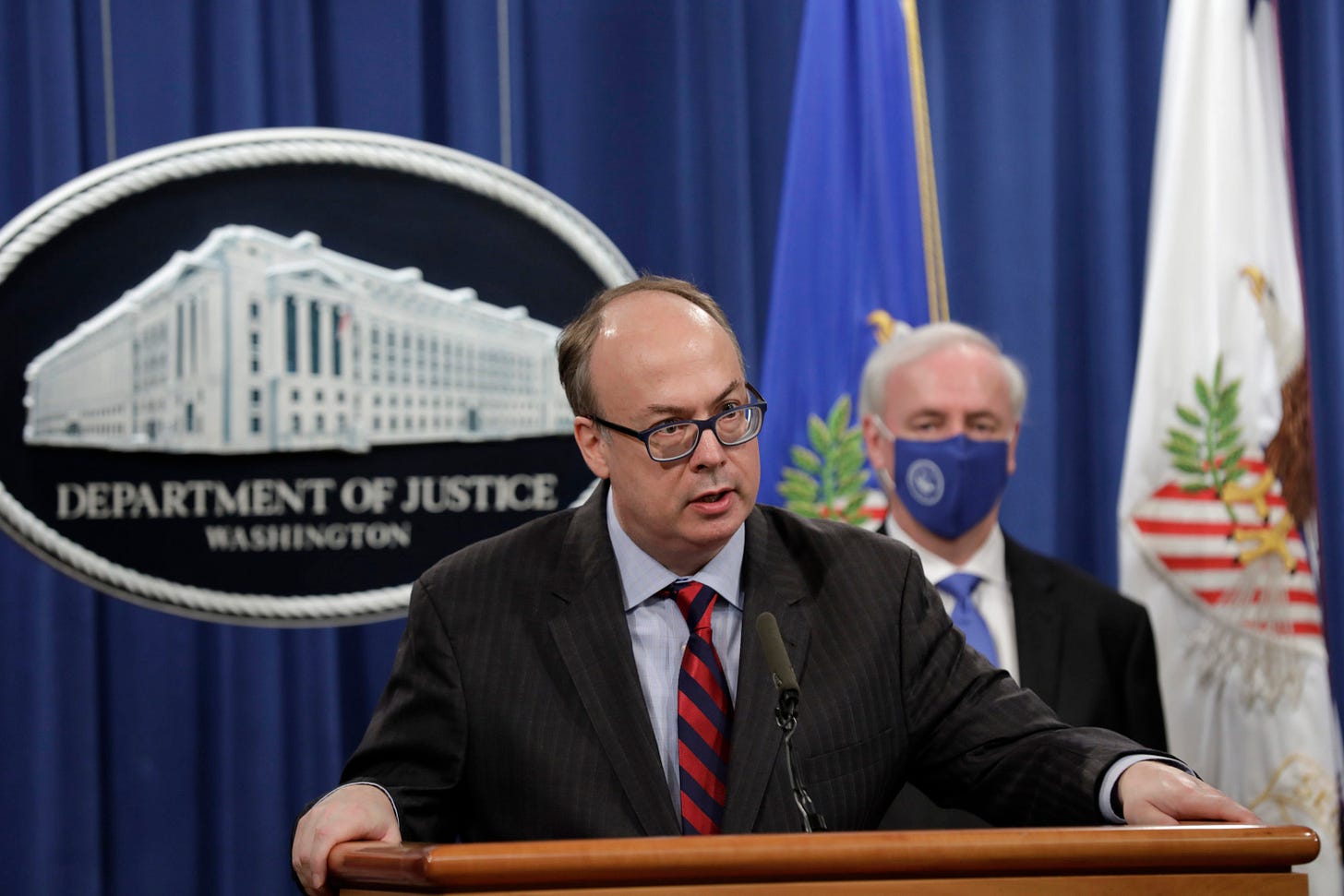Who is Jeffrey Clark and Why Does He Matter?
Clark wanted to do all the election subversion Bill Barr wouldn’t.

There’s no good reason you should know Jeffrey Clark’s name.
Before the 2020 election, he was just another run-of-the-mill Republican lawyer with a cushy appointment in the federal government. Post-election, he became a star in Trump’s eye as he proved that he was willing to do all the election subversion that his colleagues in the Justice Department refused to take part in. Today, Clark risks joining Steve Bannon as the second person charged with criminal contempt for refusing to cooperate with the January 6 committee.
So, who is Jeffrey Clark, and why does he matter?
Think of Clark as the guy who was prepared to do everything former Attorney General Bill Barr—who stated there “was no widespread election fraud” and then promptly announced his resignation and left his post on December 23—wouldn’t. Stuff like using Department of Justice resources to declare the election “corrupt,” launch investigations into bananas internet-conspiracy theories about Italygate and Dominion Voting Systems, and file federal lawsuits to those ends.
Not that he wants to talk about any of this, though.
“Contempt” might be too friendly of a word to describe Clark’s posture toward congressional investigators. He declined voluntary interviews with the Senate investigators and when the January 6 Committee came calling with a subpoena, he stonewalled.
Clark’s lawyer stated flatly, “We will not be answering any questions or producing any documents,” when Clark sat for his first deposition in November. Clark then grew irritated after an hour and a half of back and forth over why he would not talk. He said, “I think that we’re done” and walked out. The committee tried to reconvene and sent an email to his lawyer asking them to return. Too bad, the lawyer said. Counsel was on a plane to Atlanta. Byeeee.
Clark is running out of excuses, though. So far, he’s brought up shaky, blanket claims of executive privilege, said he would invoke the Fifth Amendment, and last Friday claimed that an unspecified “medical condition” prevented him from making his scheduled deposition on December 3.
He’s now scheduled to come in on December 16. You know, unless something else comes up.
Clark doesn’t want to talk, but it turns out lots of other people have been happy to talk about the things Clark did in December and January of 2020.
Senate investigators conducted extensive voluntary interviews with his colleagues who said Clark held secret meetings with Trump and then pushed his superiors to “publicly announce that DOJ was investigating election fraud and tell key swing state legislatures they should appoint alternate slates of electors following certification of the popular vote.”
Clark drafted a letter to the Georgia governor, General Assembly speaker, and Senate president pro tempore. He called it the “Georgia Proof of Concept” and suggested it could be a model for other contested states.
According to the Senate report:
The letter would have informed state officials that DOJ had “taken notice” of election irregularities in their state and recommended calling a special legislative session to evaluate these irregularities, determine who “won the most legal votes,” and consider appointing a new slate of Electors.
When then-Acting Attorney General Jeffrey Rosen rejected the idea on January 2, Clark told him Trump had offered to make him attorney general, but he would decline if Rosen would agree to sign the letter. Rosen refused. On January 3, Clark told Rosen he was going to accept Trump’s offer to replace Rosen as acting attorney general. But, Rosen quickly organized with others and threatened to resign if Trump did so. Clark’s plan fell apart. But still, it was quite the plan.
Keep in mind that Clark was proposing these steps after Trump’s campaign had lost dozens of cases in court over alleged election fraud and the states had all certified their election results, which makes his actions all the more brazen.
And, that’s the point. There was a plan to delegitimize the election and interfere with the peaceful transfer of power with many people involved. Not just the big, famous people, like Steve Bannon and the Kraken Lady. But also little people. People you’ve never heard of before. Like Jeffrey Clark.
Naturally, members of the January 6 Committee have a lot of questions.
The committee’s 22-page report recommending contempt charges for Clark says its members believe Clark had conversations with others in the government, including members of Congress, to delegitimize the election in the weeks leading up to January 6. Namely, they want to know “the impetus for Mr. Clark’s involvement and with whom he was collaborating inside and outside government to advance these efforts.”
As of now, it’s unclear whether Clark will reappear for the committee, as scheduled, on December 16. Should he claim Fifth Amendment protections, committee chairs Bennie Thompson and Liz Cheney have said he must do so on a “question-by-question basis.”
Fellow committee member Rep. Jaime Raskin explained, “You can't plead the Fifth to an entire prosecution. You can't plead the Fifth to every question you might be asked. So it applies only when you have a specific and reasonable apprehension that your answer could be used against you in a criminal prosecution.”
And that in itself would be revealing. What’s he worried about? Election fraud? Criminal conspiracy? If anyone should be worried about a damning paper trail, it’s the almost-AG, who used official resources to cast doubts on the election in coordination with the president.
“Apparently, because he believes testimony about his interactions with President Trump would tend to incriminate him and thus may subject him to criminal prosecution,” Cheney said. She pointed out if Clark goes that route, the committee would then know “exactly what testimony Clark believes may incriminate him.”
If he even shows up to plead the Fifth. Who knows? Contempt may be the least of Clark’s crimes.


